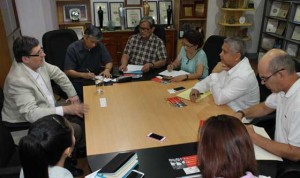The Czech government will continue to do business with the Philippines despite the controversy over the Metro Rail Transit 3 (MRT 3) extension project, newly installed Czech Ambassador to Manila Jaroslav Olsa Jr. said on Thursday.
In a roundtable discussion with reporters and editors of The Manila Times, Olsa said one controversy will not deter Czech businessmen from pursuing investments in the Philippines.
“I think businessmen know very well what they are doing. I don’t think it [scandal] had a significant impact on Czech businesses looking at the Philippines,” he said.
Olsa was addressing a question whether the statement by Former Czech envoy to the Philippines Josef Rychtar that then-MRT head Al Vitangcol tried to extort $30 million from the Czech firm Inekon had dampened Czech interest in doing business in the Philippines.
Olsa said he was in Manila 19 years ago when the discussions on the purchase of MRT 3 cars began.
He said the Czech Republic had “visible success” in the MRT 3 project.
“Regardless [of the fact] that [cars] should be maintained more properly, they are still operating. That is a good thing in my point of view,” he said.
Even after the MRT 3 controversy, Home Credit Group, the largest consumer finance provider in Czech Republic, started operations in the Philippines.
Olsa said there has been a “steady rise” in trade between the two countries in the last five years. If the financial crisis of 2009 had not come along, the trade, which stands at $400 million, could have “tripled,” he added.
Philippine exports to the Czech Republic make up $300 million of the $400 million, the balance being Czech exports to the Philippines.
The “driving force” behind the trade is the manufacture of computer parts, Olsa said, noting that there is a Filipino factory in the Czech Republic that turns out computer components.
The Czech Republic is an industrial country, and Filipino investors might want to look at small propeller aircraft, ammunition, small arms for the police force, agri technology and medical equipment, Olsa added.
He highlighted the importance of the Philippines’ focus on increasing people-to-people exchanges between the two countries.
Olsa said the Philippines could promote itself as an attractive tourist destination for Czechs who are “keen travelers.” There are only 500 Filipinos living in the Czech Republic, and an average of 2,500 Filipinos who visited the country last year.


